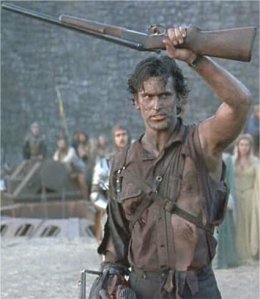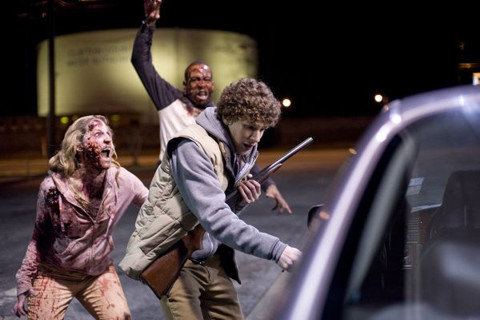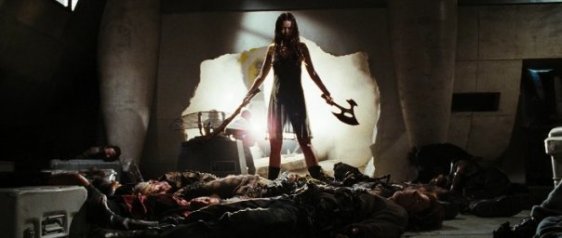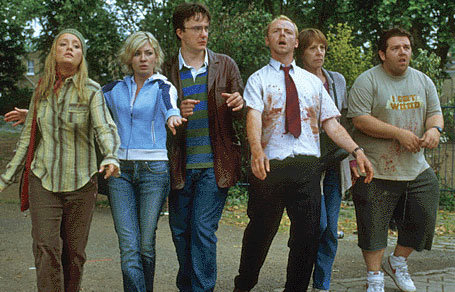UPDATE: I wrote this piece in June 2009 as a reaction to the trailer for Zombieland. Admittedly, that film was a bit more substantial than the trailer made it look, but if you’re still interested in the zombie phenomenon at large, read on!
The zombie craze has seen an upswing in recent years, ever since Danny Boyle and Zack Snyder made the novel reintroduction of zombies that can run fast. Of course, Boyle denied that his film was even a zombie movie (spoiler: it was), and Zack Snyder discovered fast zombies right around the same time he became obsessed with slow-motion, so it’s possible their contributions passed unnoticed.
But the zombie films kept coming, and they were quickly joined by unofficial video-game tie-ins and inexplicable Jane Austen crossover tales.
The latest entry in an already clogged genre is Ruben Fleischer’s “Zombieland”. Click here or on the photo above to check out the trailer.
The zombie has always evoked a rather conflicted reaction from me… The primary (and earliest) reaction is the adolescent boy, which says that blowing shit up is cool, and that goes doubly for zombies, thank you very much. The second, which has developed in the intervening years, is the amateur criminologist and armchair psychologist in me, which hypothesizes that the appeal of the zombie genre can best be explained as an indulgence for latent fantasies of mass-slaughter.
There are other archetypes (e.g. vampires, humanoid machines) that serve a similar narrative purpose– facing a horde of creatures that appear human, share human intelligence and free-will, but present an imminent threat that must be destroyed. Such archetypes, when presented effectively, can raise fascinating and provocative questions about what it means to be human, about the nature of and justification for violence, etc.
An essential characteristic of these tales is that the protagonist cannot be regarded as entirely sympathetic unless he at least briefly questions the morality of his indiscriminate slaughter. It is in this key area – the free-will and reason of the threat, leading to the incumbent empathy of the protagonist – that the zombie archetype diverges from those above.
“Reavers might take issue with that philosophy. If they had a philosophy. If they weren’t too busy gnawing on your insides.”
A zombie is a creature that looks human, and (in the films I mentioned above) is as strong and as fast as a human. But it has completely lost its humanity. It has turned into a beast, and a dangerous one at that. The slaughter of these creatures is therefore not open to any moral debate. To kill a zombie is unquestionably an act of self-defense – and indeed, the defense of others.
If you kill a zombie, you’re a hero, taking on a grim duty. You’re a defender against the invading horde. But you’re also just an everyman, defending the people he loves. You’re Atticus Finch, putting down a rabid dog to protect your children and your neighbors. Nations throughout history have striven for this kind of success in vilifying their enemies in warfare. Every empire has its barbarians, and the goal is inexorably to create soldiers that can destroy them without any moral reservations, and feel good about themselves afterward.
The zombie archetype takes this to absolute excess. “Zombieland” is the most blatant example of this so far. Woody Harrelson’s character doesn’t just kill zombies, he revels in killing zombies. He indulges in slaughter, and everything in the presentation – the narration, the campy music, the slapstick gags/kills – is designed to put the audience right there with him. Sure, I expect there will be a threadbare plot in which they have to get from Point A to Point B, and a few token innocents (little more than setpieces, really) will tag along for the ride…
But the point of the film will almost certainly be to take in the ambiance and indulge a latent, fantastical desire to be able to go on an indiscriminate, remorseless killing spree. When discussing such a spree, one example tends to spring to mind.
There were a great number of myths surrounding the 1999 Columbine High School shootings. The central falsehood was that a pair of disaffected, bullied goths engaged in a targeted killing spree of specific subsets of their classmates, such as jocks, or Christians, or blacks. Most of the student witnesses initially told a different story – that the killing appeared completely random and indiscriminate1, and authorities quickly ruled out any targeting2.
 Nonetheless, this falsehood prevailed in the media, and persists to this day. But there is one theory that the media got right– Eric Harris’ fascination with Doom, the prototypical first-person shooter from the early 90s. Harris wrote in his journal before the attack:
Nonetheless, this falsehood prevailed in the media, and persists to this day. But there is one theory that the media got right– Eric Harris’ fascination with Doom, the prototypical first-person shooter from the early 90s. Harris wrote in his journal before the attack:
I have a goal to destroy as much as possible, so I must not be sidetracked by my feelings of sympathy, mercy, or any of that. … I will force myself to believe that everyone is just another monster from Doom. I have to turn off my feelings.3
This underlying fascination with indiscriminate slaughter seems fairly universal, but the vast majority of people are sufficiently well-adjusted, empathic, and possess an adequate measure of respect for human life that the thought of actually acting upon this fascination is unconscionable. It is only in the case of psychopaths4 like Eric Harris that conscience doesn’t enter the equation.
In order to kill humans indiscriminately, Harris turned off his emotions. In order to kill zombies indiscriminately, no such emotional stifling is required.
As such, zombie-killers are not psychopaths precisely, and yet they often loosely fit many of the criteria on the psychopathy checklist5:

- Glibness/superficial charm
- Grandiose sense of self-worth
- Lack of remorse or guilt
- Callous/lack of empathy
- Need for stimulation/proneness to boredom
- Parasitic lifestyle
- Poor behavioral control
- Promiscuous sexual behavior
- Lack of realistic, long-term goals
- Impulsivity
- Irresponsibility
- Criminal versatility
Tell me that doesn’t read like Bruce Campbell’s resume (or, you know, one of his characters).
The zombie-killer is often a simplistic character, because he indulges a simplistic desire. I should be clear… I am not suggesting that zombie movies (or even violent video games) have a causal relationship with violence or psychopathy. That debate is a hornets’ nest of patent nonsense in which I have no desire to take part. I’m simply suggesting that the popularity of the zombie genre serves uniquely to indulge an intrinsic, universal fascination with remorseless slaughter. That the vast majority of us would never act on this fascination does nothing to dispute this point.
But does this medium serve a constructive purpose? Many of these films seem to have artistic merit… Some are compelling character studies about how a group of strangers band together amid disaster, and some are thoughtful renditions of the end of the world.
Some are even effective comedies, such as Edgar Wright and Simon Pegg’s Shaun of the Dead. I would even argue that SotD masterfully subverts the horror genre, but also provides an effective entry in that genre. It also relies on some strong and surprisingly dramatic performances.
An ensemble of strong performances.
Zombieland seems to have similar designs, and it’s possible that it will prove equally effective (although the trailer really makes me doubt it). Regardless of this film’s effectiveness on either level, I think it’s safe to say that when we reach the point of retooling pre-Victorian English lit, the zombie genre has just about run its course. It will do us no good as a society to dwell on it further. Granted, I doubt it will do us much harm, other than perhaps rotting our brains with exponential increases in stupidity.
But then, you never know. Perhaps it will trigger a wave of psychopathic sleeper cells, YEAH, an army of zombie-obsessed, remorseless, indiscriminate hunter-killers! And they’re on a rampage! And they must be stopped! By any means necessary!
This fall… Rick Moranis is: PSYCHO-HUNTER.
“KILL THIS! *BANG*”
Sources:
1 Cullen, Dave. Columbine. New York: Twelve, 2009, pp. 151-52.
2 Ibid, p. 125.
3 Ibid, p. 276.
4 Ibid, p. 239-246.
5 Hare, R. D. (2003). “The Psychopathy Checklist—Revised, 2nd Edition.” Toronto: Multi-Health Systems.



